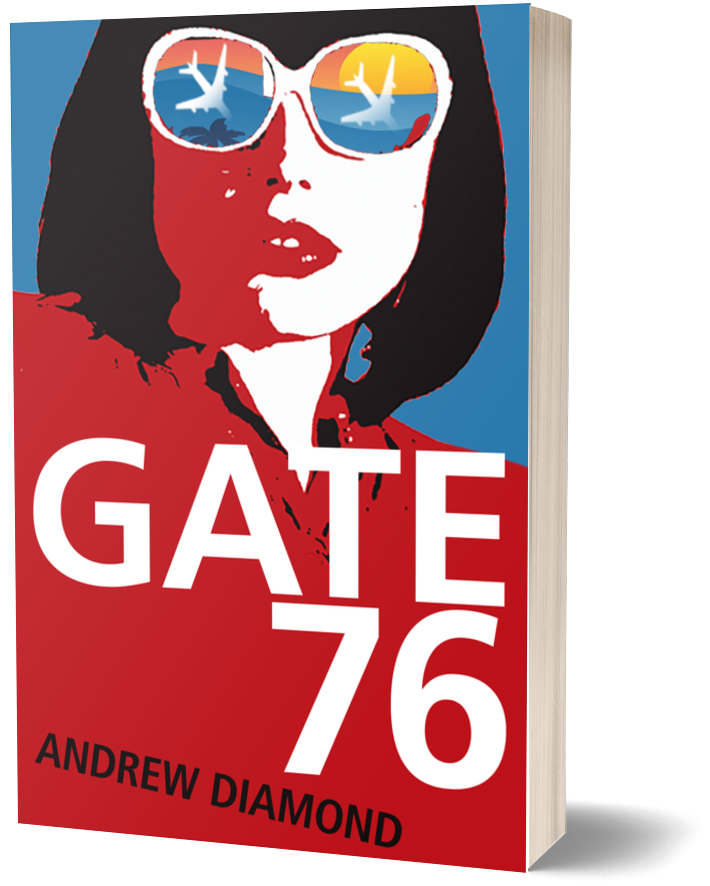Gate 76
Chapter 1
September 29
In the security line at San Francisco International, there’s this woman: blonde hair with dark roots, blue eyes that are hard and bleary and a little bloodshot, like she’s been crying, or up all night doing coke. She might be thirty, thirty-two. She wears a light-blue blouse and pale-green skirt, both wrinkled, like they came out of the laundry pile. She has a thin black sweater on top, and a silver crucifix on a silver chain around her neck. Her mouth is set in a stoic, immovable expression that says she will not give the man the pleasure of seeing her hurt or intimidated—the tall, tan-skinned man who hasn’t let go of her elbow since she showed up here twenty minutes ago.
I know his type. Not the boss, but trusted by the boss to take care of idiot-grade tasks like getting the car washed. He wears a suit he’ll never live up to. The fabric and the cut outclass him and only highlight his cheapness. This is the kind of guy the hookers want to turn down, and still he thinks they love him.
Her, I can’t quite figure out. You’d take her for a victim at first glance, with that unhappy face of long endurance and that greasy goon clamped to her arm, but there’s something else. A strong will, patience, determination. The same qualities I used to see in those fighters who kept getting up off the canvas no matter how many times I knocked them down.
They’re a few feet in front of me now, so mostly I’m looking at their backs. She’s got a canvas tote bag over her left shoulder and the guy’s holding her left arm. In her right hand is a boarding pass and ID. I can’t read the name, but I recognize the colors and the layout of the license. Washington, DC. Just like mine. I wonder if they’ll be on my flight.
When the line snakes around, I see them from the front. The guy’s face is angular, with a wide jaw, pointy chin, jutting cheekbones, and thick black stubble over oily skin. She’s slim, attractive, five seven or so. Her face is pale, but her skin is clear. No bruises or cuts. There are no marks on her hands, and her nails aren’t broken. She has a small bruise on her left knee, just below the hem of her skirt. Other than that, nothing. When I glance up again, her eye catches mine for a second with the hard look of a woman annoyed at being ogled.
You hear people talk about love at first sight: “From the second I saw her, I couldn’t take my eyes off her.” Yeah, well, train wrecks are like that too. You can’t look away. Love at first sight is a kind of premonition for people whose lives are on the golden path. They have a house and kids and a steady job coming down the pike, and they know right away who they’re going to share it with.
I get premonitions too. But with me, it’s like I see some guy walking down the street—never laid eyes on him before—and I just know he’s gonna be beating the crap out of me in an alley before the day is over. Or I’m out of town on a job, and I check my watch, and—I don’t know—just the way it says 12:33, I know my apartment’s on fire.
So I got a premonition just now, a kind of sinking feeling in the pit of my stomach. I know I shouldn’t be looking at her. Look too far into anything and you’ll find something you’re not supposed to know. And that’s the first step toward getting involved. Funny I wound up in this profession, a guy like me who always told himself to mind his own business. But it’s better than beating people up for a living. Sometimes.
I miss the crowds now and then, and the electric charge of the cheers when you land a good blow and your opponent starts to wobble. But then I remind myself that by this age, thirty-four, I probably would have been out of the sport anyway. The guys who stick around too long get brain damage. They keep moving you up to tougher opponents, and if the first thirty guys can’t beat your head in, they’ll find someone who can. If you’re lucky, that’s a million-dollar fight. That’s a Saturday night in Vegas and a full payout for the thirty beatings you inflicted just to make it that far. But really, how many people in this world are that lucky?
Lucky, for me, is not slurring my words, is being able to string together coherent sentences and having a steady job. Lucky, for me, is running into Ed Hartwell and getting a second chance.
They’re up at the front of the line now. The uniformed woman at the podium asks for their boarding passes. The guy doesn’t even offer his. Just tightens his grip on the blonde woman’s arm, pulls her toward him, and whispers some rough threat in her ear. Then he walks away. Just leaves the line and heads back toward the exit.
The woman doesn’t look after him. She hands her boarding pass and ID to the TSA agent. I can’t see her face, but the guy on the other side of security can. The short Vietnamese guy emptying the garbage can into his big rolling bin. He’s not watching what he’s doing. He’s watching the blonde.
The agent shunts her into the line on the left. A minute later, I’m sent off to the line on the right. I lose sight of her as I’m filling my bin for the X-ray. Wallet, phone, belt, shoes. No carry-on this time. I paid the twenty-five bucks and checked it.
On the far side of the X-ray machine, I get my shoes back on and look for a place to eat. Every TV in the terminal is tuned to CNN. It’s a slow season for news, so the coverage focuses on the gubernatorial elections in the few states that are still up for grabs. The whole country is sick of the promises and innuendo coming out of Florida, Ohio, Pennsylvania, and especially Texas, where that fat cop-turned-governor has a threat on his lips for anyone who doesn’t see things his way, and an opponent he just can’t get rid of. I find a bar where the muted TVs replay the baseball highlights.
Twenty minutes later, I’m halfway through a beer, thinking about the case I’m working and what I’m going to tell Ed Hartwell when I get back to the office. First I’ll tell him, yes, the guy I followed out here from DC did go into a bank. Two banks. He has safe deposit boxes at both, but not under his own name. They belong to his parents, who are both in homes with Alzheimer’s. I managed to persuade the bank managers to tell me what he put in them: tiny corpses wrapped in burial shrouds. So, yeah, he probably did steal the artifacts. Where he finds a market for ancient religious statuettes, I have no idea. But the Smithsonian will be glad to hear they’re not lost. We’ll have to get the Feds to look into the boxes, and then it’s out of our hands.
I’ll also tell Ed we should be upgraded to first class. Not that we fly all that often. But Baker/Watson, the law firm that gives us a big chunk of our work, represents the airline and the Baker/Watson guys always get bumped up to first. At my size, it makes a difference.
In four and a half years of work together, Ed and I have only had one case that directly involved the airline. They thought two of their baggage handlers at Dulles were involved in some kind of smuggling. The airline had their own guys watch them at work and then we watched them the rest of the time. Turns out there were four of them, and they were dealing, not smuggling. Their extracurriculars had nothing to do with their day jobs. Once the airline was sure they were off the hook, they fired the guys, and we turned the case over to the Fairfax County cops.
I see the Vietnamese guy with the garbage cart shaking out a clear plastic bag to replace the one he just pulled out of the can. He’s got close-cropped hair and big ears that stick out from the sides of his head like radar dishes. He’s looking down the terminal like he’s on alert. I follow his eyes, and there she is, walking all alone, looking sideways into the shop windows and fingering the silver crucifix between her breasts. The bag looped over her shoulder has a big red apple logo on the side, like a target.
She goes into the newsstand and comes out again a minute later. The agent at gate seventy-six is making the last call for the flight to Honolulu. The Vietnamese guy makes his way toward her with some urgency. He passes a few trashcans on the way without checking them, but he keeps a good forty feet behind her so she won’t notice him.
I leave my half-finished beer on the table and follow him. I’m not even on the job. It’s just habit—like a cat following a mouse it doesn’t want because it has instincts it just can’t ignore.
She walks slowly to the back of the line at gate seventy-six and pulls her boarding pass from her shoulder bag. A few passengers file in behind her. I’m past the Vietnamese guy. Twenty feet in back of her. Too close. She turns and looks over her shoulder, right past me, and her eyes show an animal wariness as she surveys the terminal. The short, fat gate agent with the long black hair reads her boarding pass and then hands it back to her. Why didn’t she scan it?
The tall bald guy, next in line, hands her his pass. The attendant puts her hand over the scanner and shakes her head. She reads the pass and hands it back to him and waves him through.
The blonde is on the gangway. The Vietnamese guy wheels his cart down past the next gate, past the next set of garbage cans, then just leaves it and walks on quickly. Looks like he’s got his phone to his ear, telling whoever he’s supposed to tell that she’s on the plane.
The gate agent continues reading passes. There are five more people in the line. The other agent, the one who works the computer terminal and deals with the standbys, has already left. The twelve people on standby will have to look for another flight. Three more passengers in the line. Two. One. None. The gate attendant picks up the phone and makes a call.
And then she pops out of the gangway. The blonde. She’s looking in her bag, a little frantic, a little too dramatic. She’s overacting. She makes like she’s going to say something to the gate agent, maybe ask her to hold the plane for a minute. But when she sees the agent doesn’t notice her, she just keeps walking and digging through her bag.
Did she leave her wallet at the newsstand? That seems to be where she’s headed. But she walks right by it, and then she relaxes a little. She stops digging through her bag and goes into the bathroom. I stand there for a minute watching the women go in and out. Two minutes. The door at gate seventy-six is locked. She’s not out. Five minutes. The plane is pushing back and the gate agent is gone. The standby passengers have all cleared out.
I’m about to walk away when a dark-haired woman comes out of the bathroom, wearing big dark sunglasses, a white blouse, black skirt, black heels, a little bruise on her left knee. Her straight black bangs are cut half an inch above the eyebrows. The canvas tote bag looped over her shoulder is turned inside out, so no logo shows. But she’s still wearing the black sweater on top of the new blouse. Why? I move a little closer.
She raises her left arm to check her watch, pushes the sleeve back with her right index finger. Her left wrist is bruised all the way around. Dark purple. Her right sleeve cuff slides back half an inch. Same bruises on that side. She goes past me, eyes on her watch, and now I’m following again.
She’s two inches taller in those heels that clomp like hooves along the polished stone floor. The undercurrent of strength and will I saw in her before is now on full display. She moves with speed, determination, and certainty. She knows exactly what she’s doing.
She passes several gates and then turns quickly to the left, right into the back of the line for the Chicago flight. Last call, and she’s the last passenger in the queue of three. No wonder she was walking so fast.
She takes her glasses off and fishes another boarding pass from her bag. At the counter, she pushes it straight to the scanner, like she’s going to scan it herself. The attendant takes it from her hand mechanically and passes it over the glass, but the scanner turns red instead of green. The attendant looks at the paper, a little puzzled, and then separates it into two. There are two boarding passes. She’s catching a connecting flight in Chicago. The agent scans the right pass and returns the papers.
The other gate agent is already kicking the wedge out of the door to the gangway so she can close it. The blonde, now brunette, takes one last look over her shoulder, and when her eye catches mine, there’s the spark of recognition as she remembers me from the security line—the big guy who was examining her a little too closely. She starts, with a look of pale terror, then turns forward and disappears with quick, unsteady steps.
Normally, I wouldn’t mention any of this. Troubled people and their troubled lives, I try to put out of my head. God knows I see enough of them. But this one got to me, I don’t know why. Like I said, sometimes you get a premonition. Sometimes you just know a world of trouble is about to open up and swallow you, and all you can do is wait to see what happens next.
When I get off the plane at Washington Dulles, it’s almost midnight. I take my phone out of airplane mode, and there’s a message from Ed. “Call me as soon as you get this.” He doesn’t say what it’s about, but he doesn’t have to.
When I step into the terminal, my face turns upward, like the faces of every other passenger coming off that plane. Up to the monitor. To CNN, and the reporter on the beach with his wind-blown hair. The Honolulu flight that left from gate seventy-six broke into pieces and went down into the sea.
The reporter keeps saying the flight was full. Every seat was taken.
But it wasn’t full.







